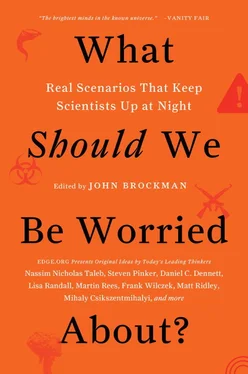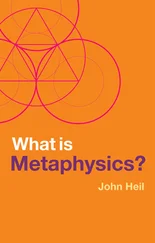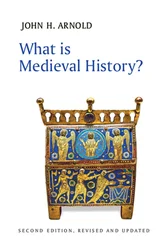THE GROWING GAP BETWEEN THE SCIENTIFIC ELITE AND THE VAST “SCIENTIFICALLY CHALLENGED” MAJORITY
LEO M. CHALUPA
Neurobiologist; ophthalmologist; vice president for research, The George Washington University
On a cross-country flight, I once found myself sitting next to a successful attorney who remembered attending a lecture I had given on brain research about ten years earlier at a private club in San Francisco. During our conversation, he asked me if I was still trying to figure out how the brain works. When I indicated that I was still doing research in this field, he seemed surprised, because he thought that after ten years of effort this would be all figured out.
At that moment, it struck me that this highly educated man had no understanding of how science works. He was scientifically ignorant, and the degree he had received at a leading research university before entering law school failed to educate him in the most basic tenet of the scientific process—that research is a never-ending quest.
Now, consider the vast factual ignorance that has repeatedly been documented in recent years. Most people do not believe in evolution; a substantial proportion believe that Earth is only a few thousand years old; many think that vaccines do more harm than good; and (a particularly troubling one for those of us in the brain sciences) it is commonly thought that the brain is a muscle.
Contrast this dismal state of affairs with another personal experience. This involved the hosting of the Siemens High School Science Competition by The George Washington University, where I serve as vice president of research. The finalists in this competition, selected from high schools around the country, presented the results of their research projects. These far surpassed anything I could have possibly accomplished when I was a student at New York’s elite Stuyvesant High School in the 1960s. Indeed, as several of the professor judges remarked, the research of these high school students was on a par with that of graduate students or even postdoctoral fellows.
So here is the crux of my worry: the growing gap between the small minority of Americans who are part of the scientific elite and the vast majority who are, to put it kindly, scientifically challenged. This is a worry on several different levels. For one thing, support and funding for research is vitally dependent on informed voters, and even more so on scientifically literate elected representatives. Moreover, as our world faces progressively more challenges (think climate change), how we deal with these complex issues is dependent on an understanding of science and the scientific method.
It is also worrisome that, for the most part, our educational institutions from grade school through college do not teach science the way scientists actually do science. Far too often, science courses involve memorization of a vast array of seemingly unrelated “facts,” many of which are of questionable validity. We must do far better, and we need to do so now. Students at all levels should be introduced to science by asking questions and designing experiments to test specific hypotheses. Every town and city should have a hands-on children’s science museum, and every professional scientific organization should have a community outreach program. Some of this is already being done, but the gap between the scientifically informed and uninformed continues to grow. So I continue to worry and will do so until we come up with a realistic plan to reverse this troubling trend.
NOGA ARIKHA
Historian of ideas; chair, Critical Studies, Paris College of Art; author, Passions and Tempers: A History of the Humours
I worry about the prospect of collective amnesia.
Whereas access to information has never been as universal as it is now thanks to the Internet, the total sum of knowledge of anything beyond the present seems to be dwindling among those who came of age with it. Anything before 1945 (if then) is a messy, remote landscape; the centuries melt into each other in an insignificant magma. Famous names are flickers on a screen, their dates irrelevant, their epochs dusty. Everything is equalized.
The stunning historical blankness displayed by students the world over when they arrive at college can be explained. For one thing, confusion has set in about what should be taught. The canon—in any country—is now considered, by many who are supposed to teach it, an obsolete, “imperialist” weapon to be shunned, not an expandable, variable set of works that have passed the test of time and should begin the learning process. Chronology is moot: Instead, students can pick general themes, analyze perspectives and interpretations. History certainly needs to remain a thoughtful enterprise—one would not want it to turn back into a list of dates, monarchs, and battles. But because the laudable emphasis on questioning has taken the place of teaching questionable facts, temporal continuities have been lost, and students have few guides other than the Internet, which has become their reference, their ersatz library.
So there’s the rub of technology. Those who come of age today are challenged by the inventions from which their elders reap benefit: Facebook disperses everyone’s attention but captures theirs in a particularly intense way. Wikipedia is a useful shortcut everyone can use as a starting point for proper research, but students use it as if it constituted all research. Without a background in leafing through books, learning in the old analog way how to gauge relevance, hierarchy, accuracy, and cross-references, students arrive at college unable to know where to begin their education and so where to place themselves within the wider world; they are confused about what constitutes the beginning of knowledge. A few do learn how and what to ask and may find the guidance to delve into the world’s histories, acquiring a sense of perspective and of what it means to know that one doesn’t know. But for a majority, the gaps will persist into maturity, unidentified and unplugged.
Certainly worries emerge whenever technology changes the mode of cultural transmission. Though there might be a correlation between the acceleration of technological transformations and the speed at which the past recedes, one should not forget that the fear of forgetting was strong when printing became common. If forgetfulness has increased, it is not because of new technology per se but despite it: It is because curricular fashions are mimicking Internet entropy rather than providing the centripetal force needed to turn the young into its informed users. As it is, ours is an age of information glut, not deep knowledge.
The very way in which science is practiced, for instance, rewards short-term memory combined with a sense that the present exists for the sake of the future. Ten-year-old scientific papers are now ancient; after all, over a million new papers are published each year. As a result, some groundbreaking work from the 1920s in, say, zoology, lies forgotten and is produced in new labs as if it had never been done before. Almost everything is archived, but nothing can be found, unless one knows to look for it. Many may be reinventing the wheel, unaware that the historical permafrost is full of treasures.
The same applies to the longer history of science, the history of art, the history of philosophy, and political and economic history. (Some of our present woes arguably arise out of the historical myopia of economists.) References to early modernity have become a highly specialized affair, hard to place in chronology. For many, and not only for students, history is of the modern, not of what precedes the modern, when science was magic, all art was the same, and all politics autocratic. History is not so much simplified as disappeared. There are pockets of awareness, pre-modern eras considered fascinating by a general public and picked up by Hollywood; for the West, these would include, say, ancient Egypt, Greco-Roman antiquity, the “Middle Ages,” the Renaissance, the Moghuls in India, the American Civil War, the French Revolution. But each is viewed as a self-contained epoch—easily skippable episodes in the potentially entertaining soap opera or costume drama that is the history of the world. And so, deeper questions of historiography cannot even begin to be addressed.
Читать дальше












